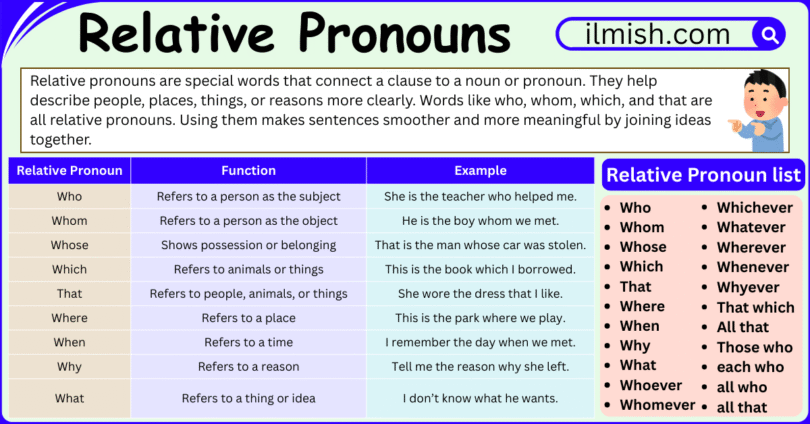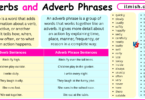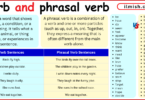When we learn English, it is important to know the words that connect ideas in a sentence. Relative pronouns are special words that do this job. They help us give more information about a noun without starting a new sentence. Words like who, whose, which, whom, and that are common examples of relative pronouns. They make our speaking and writing smoother and more meaningful. In this article, we will discover relative pronouns in English with clear definitions and examples to help you understand and use them correctly in daily life.
Definition of Relative Pronouns in English
What Are Relative Pronouns in English?
A relative pronoun is a word that introduces a relative clause and connects it to the main sentence. It shows the relationship between the noun in the main sentence and the extra information in the clause.
For example:
- The book that I read was interesting.
- She is the teacher who helped me.
Here, that and who are relative pronouns because they link extra information about the noun.
Common Relative Pronouns
The most commonly used relative pronouns in English are:
| Relative Pronoun | Usage | Example Sentence |
|---|---|---|
| Who | Refers to people (subject) | The girl who won the race is my friend. |
| Whom | Refers to people (object) | The man whom I met is kind. |
| Whose | Shows possession | That is the boy whose father is a doctor. |
| Which | Refers to animals or things | This is the car which I bought yesterday. |
| That | Refers to people, animals, or things (informal) | The house that we saw is beautiful. |
How Relative Pronouns Work
Relative pronouns are used to:
Join two sentences
- I saw a woman. She was my teacher.
- I saw a woman who was my teacher.
Add extra details without repeating words
- This is the phone. I lost the phone.
- This is the phone that I lost.
Make sentences shorter and smoother
The man whose car was stolen is angry.
Subject and Object Relative Pronouns
Relative pronouns can act as the subject or the object in a sentence.
| Function | Example |
|---|---|
| Subject | The boy who is running is my brother. |
| Object | The boy whom I saw was crying. |
👉 Tip: In modern English, “whom” is less common in everyday conversation, but it is still important for exams and formal writing.
Restrictive vs. Non-Restrictive Clauses
Relative pronouns are also used in restrictive and non-restrictive clauses.
| Type | Explanation | Example |
|---|---|---|
| Restrictive Clause | Gives essential information, no commas are used. | The student who studies hard will succeed. |
| Non-Restrictive Clause | Gives extra information, commas are used. | Ali, who is my best friend, lives in London. |
Advanced Use of Relative Pronouns
Sometimes, relative pronouns are dropped in informal English.
- The book that I read → The book I read
- The person whom I met → The person I met
👉 This is common in spoken English, but in exams, it is safer to use the full form.
Important Notes for ESL Students
- Use who/whom only for people.
- Use which for animals and objects.
- Use that for people, animals, and objects in everyday English.
- Use whose to show possession (ownership).
Quick Recap Table
| Relative Pronoun | Refers To | Function |
|---|---|---|
| Who | People | Subject |
| Whom | People | Object |
| Whose | People/Things | Possession |
| Which | Animals/Things | Subject/Object |
| That | People/Animals/Things | Subject/Object |
Example Sentences of Relative Pronouns
| Relative Pronoun | Sentence |
|---|---|
| who | She is the teacher who helps us. |
| who | I know the boy who plays football. |
| whom | The man whom we met was kind. |
| whom | She is the person whom I trust most. |
| whose | That is the girl whose bag is red. |
| whose | I met a boy whose father is a doctor. |
| which | This is the book which I like most. |
| which | The car which broke down is mine. |
| that | He is the friend that called me yesterday. |
| that | This is the pen that I lost. |
| where | This is the park where we play daily. |
| where | I know the shop where she works. |
| when | I remember the day when we met. |
| when | Summer is the season when we travel. |
| why | Tell me the reason why he left early. |
| why | I don’t know the reason why she cried. |
| which | She wore a dress which looked beautiful. |
| that | The movie that we watched was funny. |
| who | The girl who sings well is my friend. |
| whose | The man whose car broke down needs help. |
List of Relative Pronouns in English
- who
- whom
- whose
- which
- that
- where
- when
- why
- whoever
- whomever
- whichever
- whatever
- whereever
- whenever
- what
- as
- the one who
- the one that
- those who
- those that
- anyone who
- anyone that
- anything that
- somebody who
- somebody that
- all who
- all that
- each who
- those whose
Learn more helpful articles








